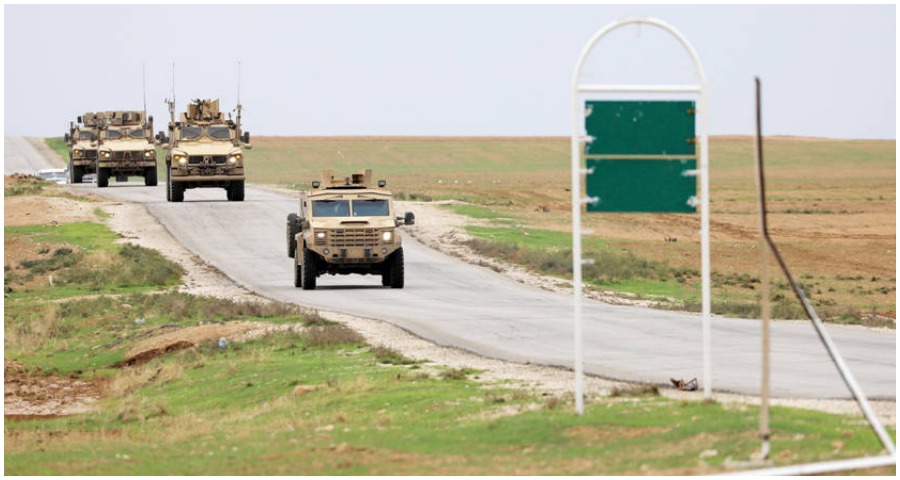Where do international conflicts and crises take Syria?
The regime is strengthening its forces in the areas of (de-escalation) and preparing for a battle. Turkey threatens attacking the north and east of Syria again, and inform the mercenaries in Idlib that they must depend on themselves, ambiguity in the American stance, all this took place after important events, most notably, Putin and Erdogan meeting. Is there a new deal?

Many analyses are done about what is going on in the Middle East and Syria in particular, from killing of Qassem Soleimani by the United States, the escalation of Turkey in Libya and its retreat in Idlib, to the preparation of the regime and Russia to attack Idlib, all that indicat that there is a deal on one of the absent corners. Will it be the north eastern Syria?
Since the Russian-Turkish-Iranian rapprochement under the name of Astana Guarantors. Syrians have called them a trilateral deal. After each meeting, aspects of a new deal becomes clear at the expense of the Syrian people.
But the most important question is why Iran has become absent from the movements of this alliance and far away somewhat from the entire Syrian file.
To be able to read the future events in Syria, we must clarify what are the real differences; firstly, Turkey is trying to expand its occupation of the Syrian territories, and take SDF as a pretext, secondly, existence of Iran, which is rejected by both the United States and Israel in Syria, and thirdly, Russia's presence in Syria and the contradiction of its relationship with the regime, Turkey and Iran, and its attempt to find an understanding with the West.
After the military victories of Russia in Syria, it couldn’t benefit from them politically because of the U.S. obstacle, so Lavrov- Kerry meeting came to clarify aspects of an agreement that outlines the influence map in Syria, and crises started to dissolve gradually despite the escalation of competition.
Russia believes that the Iranian presence stands in the way of completing its victory, and pledged to reduce its presence in Syria, to complete it during Jerusalem summit between Russia, America and Israel, after which Iran withdrew from the bordering areas with Israel in southern Syria, and Israel launched raids on the Iranian forces positions over large areas under the eyes of Russia.
These moves have reached the point that Russia excluded Iran from the guarantors of Astana movements. Washington has always said that it does not accept Iran presence in Syria. Russians and Turks have clearly promised Washington to carry out this mission. The question here, is there a Russian-Turkish role in targeting Qassem Soleimani who left Damascus before killing him in Iraq? An Iranian newspaper posted a picture of Putin and Bashar al-Assad during their meeting in Damascus, titled it as Putin and Assad celebrating Qassem Soleimani's death.
Thus, the Iranian knot has almost disintegrated, much of the U.S. reservation has been removed, Turkey's problem with the Russians and the regime has remained in Idlib. Despite all that is going on, there are differences and uneven escalation, but the most prominent scenario is that Turkey has started to promote its withdrawal from the areas that Russian-backed regime is seeking to advance through which are the city's rural areas, as the Turkish foreign minister has stated that the opposition must rely on itself to stop the attacks, so that the Turkish knot with the regime is coming to an end.
The third knot is the issue of the Russian objectives. Russia supports the Syrian regime, and agrees with Turkey, which has sought to overthrow the regime, and it competes with America while seeking to agree with it. What does Russia want in Syria?
Russia seeks to show itself as a major and influential force in the Middle East, and supported the Syrian regime that controlled militarily large areas, but the U.S. presence is an obstacle in the way of its victory. It realizes that the United States is able to reduce its joy anywhere in Syria, so it is trying to please the United States United.
As for the relationship between Russia and Turkey, Russian-Turkish interests are much more important for Russia than what Turkey is exploiting. Turkey and Russia are aware of each other's strong needs, the two countries have the same goal of strengthening economic relations and increasing the size of trade to $100 billion instead of 40 billion, and Ankara should be the port for Russia's gas exports to Europe.
Russia is in dire need of Turkey, especially with the suffering of the Russian economy due to the Western sanctions, collapse of oil prices, ban on the import of food from the European Union countries and the United States, high inflation rates, collapse of the ruble and foreign investments going out, as they need the Turkish goods and products to lower the temperature of prices.
Russia also needs the "Turkish Torrent" pipeline launched by Putin during his recent visit to Turkey, and construction of Turkey's" Akkuyu" atomic power plant, which cost billions of dollars.
Russia also won much of its understanding with Turkey, becuse the latter handed over areas under the control of its mercenaries to the regime forces, and Turkey took advantage of it and occupied the areas of Afrin, Tal Abyad and Seri Kania with a Russian green light, and a blur in the U.S. position.
As we see that America succeeded in reducing the Iranian influence, Russia controlled most of Syrian territory, expanded its political and economic influence in Turkey, NATO's member, and remained Idlib, which is now close to the bottom line where it will be resolved mostly in favor of the regime and Russia, but what is in return?
A.J
ANHA













